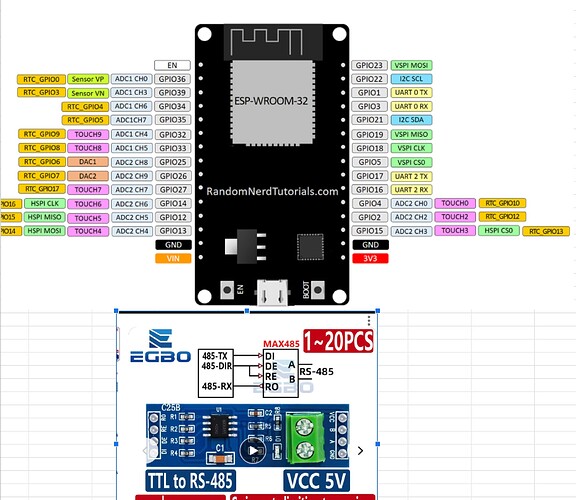I want to understand this issue so as not to ask more questions
We have concluded together that modbus_controller doesn’t give any data because it expects answer from 81. Right?
so this line doesn’t return anything:
float vv = (data[3]+data[4])* 0.1;
Right? Dead end.
You have to work with uart_debug.
Code in your post46 is where you need to work on.
Use the piece of code in my post58 in your uart_debug and get all those registers same way from 0x52 (bytes[4]) to 0x59 (bytes[13])
By the way, you only posted a screenshot of modbus registers. There are others, writeable registers?
I can post all the documentation that I have
Don’t be shy ![]()
[22:33:46][D][uart_debug:114]: <<< 51:03:10:00:01:00:01:00:00:00:00:00:00:0D:00:00:00:00:00:F7:C9
[22:33:46][D][main:047]: Response data only had 21 bytes!!
I can’t do this, the forum doesn’t allow me to upload files here
Sorry my mistake( serious brain fart). Every register is 2 bytes, so 21 is correct.
if (bytes.size() == 21) {
int chargingMosStatus = bytes[3] + bytes[4];
id(cms).publish_state(chargingMosStatus);
int dischargeMosStatus = bytes[5] +bytes[6];
id(dms).publish_state(dischargeMosStatus);
I’m not going to open files from that source, but have a look if there is writeable register for modbus id.
Second brain fart… ![]()
thanks, I’ll find the time and get on with it
You are almost there…
were you able to get this to work? I have a 100balance bms as well
uart:
- id: uart_0
baud_rate: 9600
tx_pin: D2
rx_pin: D3
debug:
direction: BOTH
dummy_receiver: true
after:
delimiter: "\n"
sequence:
- lambda: |-
UARTDebug::log_hex(direction, bytes, ':');
ESP_LOGD("main", "Response data only had %d bytes!!", bytes.size() );
std::string str(bytes.begin(), bytes.end());
if (bytes.size() == 27) {
ESP_LOGD("main", "Response data %d", bytes[0]);
ESP_LOGD("main", "Response data %d", bytes[1]);
int tv = (bytes[3] << 8) | bytes[4];
id(tbv).publish_state(tv);
int curent = ((bytes[5] << 8) | bytes[6]) - 30000;
id(cd).publish_state(curent);
int so = (bytes[7] << 8) | bytes[8];
id(soc).publish_state(so);
int di = (bytes[23] << 8) | bytes[24];
id(dif).publish_state(di);
}
modbus:
- id: modbus0
uart_id: uart_0
send_wait_time: 1000ms
disable_crc: true
modbus_controller:
- id: bms
address: 0x81
modbus_id: modbus0
command_throttle: 5000ms
update_interval: 2s
setup_priority: -20
sensor:
- platform: template
id: tbv
name: TolalVoltage # 0x38 register
filters:
- multiply: 0.1
accuracy_decimals: 1
unit_of_measurement: "V"
- platform: template
id: cd
name: CurrentData # 0x39 register
filters:
- multiply: 0.1
accuracy_decimals: 1
unit_of_measurement: "A"
- platform: template
id: soc
name: SOC # 0x3A register
filters:
- multiply: 0.1
unit_of_measurement: "%"
accuracy_decimals: 0
- platform: template
id: dif
name: DiffVoltage # 0x42 register
filters:
- multiply: 0.001
accuracy_decimals: 3
unit_of_measurement: "V"
- platform: modbus_controller
modbus_controller_id: bms
id: custom
custom_command: [0x81, 0x03, 0x00, 0x38, 0x00, 0x0B] # 0x38 first register to read, 0xB = 11 register count (27 byte response)
Thanks!! Did you wired the bms via UART port directly to ESP32 board ( TX pin 6 and RX pin 5)? Sorry the original thread mentioned RS485. If it’s RS485… i’m guessing you’ll need the TTL → RS485 board in between?
I’m using a UART RS485 converter
Nope, not with the default esphome RS485 component





